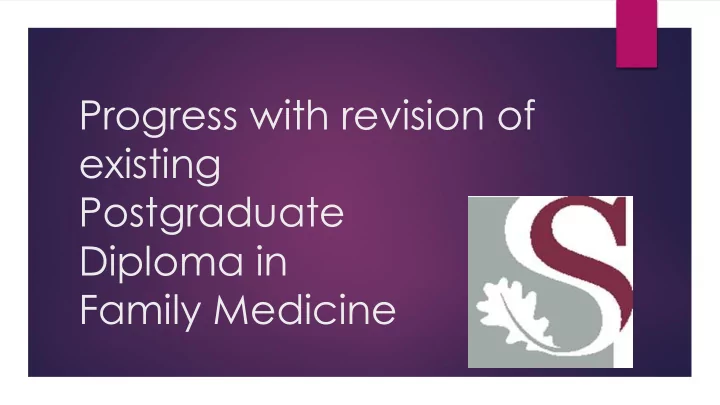

Progress with revision of existing Postgraduate Diploma in Family Medicine
Modules Year 1 Competent Clinician New 1 2 Consultation 3 Community-oriented Primary Care Year 4 Teaching and Learning Existing 2 5 Chronic Disorders 6 Leadership and Clinical Governance
Evidence-based Medicine in the Competent Clinician module • Ask a structured EBM question regarding a clinical problem • Search effectively for the best evidence to answer this question • Select an appropriate type of article from the results of this search • Critically appraise the medical literature including guidelines, review articles, and original studies. • Explore how evidence-based medicine can be practically used in your context
Consultation • Describe the different styles of consultation • Describe the structure of the consultation • Describe the tasks that should be achieved in a consultation • Describe the communication skills that can help achieve these tasks • Make a holistic assessment of a patient and express it as a 3-stage assessment • Use a genogram as part of a consultation • Describe the principles of motivational interviewing • Describe the principles of breaking bad news • Observe, reflect on and critique the consultation • Demonstrate better consultation and communication skills
Ethics in the Consultation module • Identify an ethical dilemma when it arises in your practice • Articulate the dilemma using ethical terminology • Apply a problem solving approach in which the law, ethical principles and theories, medical information, societal and institutional norms and personal value system are reflected • Formulate possible solutions to the ethical dilemma • Implement these solutions so that you provide health care in an ethical, compassionate and responsible manner that reflects respect for the human rights of patients and colleagues.
Family-oriented Primary Care in the Consultation module • Demonstrate an understanding of the human life-cycle and how this can be applied in practice • Demonstrate a family-orientated approach to primary care such as being able to identify aspects of the family that impact on the health of the individual and vice versa. • Develop confidence in engaging with families • Develop your ability for reflection as a tool for self-awareness in order to be more effective in the doctor-patient relationship
Community-Oriented Primary Care • Describe the concept and steps of community-oriented primary care • Define and characterize a community within which your practice is situated • Prioritize the major health issues of that community • Design an intervention that would address one of the high priority health issues
Chronic Disorders • Organise Chronic care in your health district • Implement an audit in your practice to understand baseline data for improving the quality of care for a chronic condition • Describe current theories of disease prevention and health promotion and apply them to your own practice and health district in a systematic way • Describe the principles of palliative care and issues of death and dying
Competent Clinician Consultation Community-oriented Primary Care Teaching and Learning Chronic Disorders Leadership and Clinical Governance
Competent Clinician Run over 2 years Focus on ambulatory care Include elements of Evidence-based medicine clinical questions, guidelines and critical reading
Consultation Consultation and communication skills Including elements of Ethics and Family-oriented Primary Care
Community-oriented Primary Care No change
Teaching and Learning Focus on Primary Care teams
Chronic Disorders Focussing on systems of care and Primary Care
Leadership and Clinical Governance Focus on audit, statistics/indicators, quality improvement Change agent
Assessment E-portfolio on our LMS = SunLearn National exit exam
To be done: Yearbook changes Create new module = competent clinician Adapt existing modules Consider dropping NQF level to 8 Incorporation of 10% contact time for full subsidy purposes
Recommend
More recommend